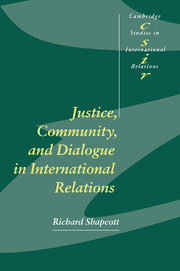Book contents
- Frontmatter
- Contents
- Acknowledgements
- Introduction
- 1 Beyond the cosmopolitan/communitarian divide
- 2 Community and communication in interpretive theories of international relations
- 3 Emancipation and legislation: the boundaries of conversation in poststructuralism and the critical theory of IR
- 4 Philosophical hermeneutics: understanding, practical reasoning and human solidarity
- 5 Philosophical hermeneutics and its critics
- 6 Towards a thin cosmopolitanism
- Conclusion
- Bibliography
- Index
- CAMBRIDGE STUDIES IN INTERNATIONAL RELATIONS
Conclusion
Published online by Cambridge University Press: 22 September 2009
- Frontmatter
- Contents
- Acknowledgements
- Introduction
- 1 Beyond the cosmopolitan/communitarian divide
- 2 Community and communication in interpretive theories of international relations
- 3 Emancipation and legislation: the boundaries of conversation in poststructuralism and the critical theory of IR
- 4 Philosophical hermeneutics: understanding, practical reasoning and human solidarity
- 5 Philosophical hermeneutics and its critics
- 6 Towards a thin cosmopolitanism
- Conclusion
- Bibliography
- Index
- CAMBRIDGE STUDIES IN INTERNATIONAL RELATIONS
Summary
Justice is like the pre-original, anarchic relation to the other, and akin to the undecidable. It represents the domain of the impossible and the unrepresentable that lies outside and beyond the limit of the possible and the representable.
This investigation began by suggesting that the goal of reconciling community with the recognition of difference represented an impossible task. The argument that followed was premised on the assumption that the goal of achieving justice to difference in a universal community should be pursued nonetheless. This book has presented an account of a thin cosmopolitanism which endeavours to accommodate the widest possible variety of cultures and cosmologies. It has argued that philosophical hermeneutics in dialogue with liberalism, communitarianism, critical theory and poststructuralism can help to provide such an account. While aspiring to a thin community in which difference is engaged with equally the model of conversation itself embodies a substantive moral position which is not neutral, in the liberal sense of impartiality.
Philosophical hermeneutics informs a particular variant of a communicative approach to addressing moral issues and conceiving of community. It is informed by an argument that communication provides a superior form of relationship to the alternatives of annihilation, assimilation and coexistence. However, the argument has not rested here. The claim made for philosophical hermeneutics in this book is that communication requires a rehabilitation of the concept of truth.
- Type
- Chapter
- Information
- Justice, Community and Dialogue in International Relations , pp. 233 - 238Publisher: Cambridge University PressPrint publication year: 2001

